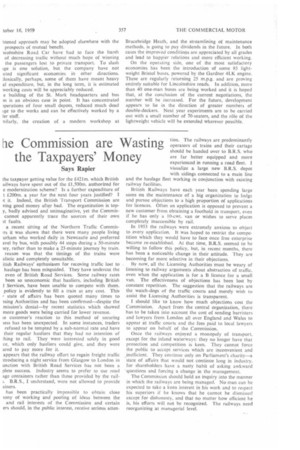he Commission are Wasting the Taxpayers' Money
Page 63

If you've noticed an error in this article please click here to report it so we can fix it.
Says Rapier
the taxpayer getting value for the £421m. which British ailways have spent out of the £1,500m. authorized for e modernization scheme? Is a further expenditure of t £200m. a year for the next four years justified? I Lit. Indeed, the British Transport Commission are ving good money after bad. The organization is topy, badly advised and unimaginative, yet the Commiscannot apparently trace the sources of their own it faults.
a recent sitting of the Northern Traffic Commis:rs it was shown that there were many people living urham who worked daily in Newcastle and preferred avel by bus, with possibly 44 stops during a 50-minute ley, rather than to make a 23-minute journey by train. reason was that the timings of the trains were alistic and completely unsuitable.
itish Railways' enthusiasm for recoving traffic lost to haulage has been misguided. They have undercut the even of British Road Services. Some railway rates been so uneconomic that hauliers, including British I. Services, have been unable to compete with them. policy is evidently to fill a train at any cost. This 7 state of affairs has been quoted many times to esing Authorities and has been confirmed—despite the mission's denial—by recent statistics which showed more goods were being carried for lower revenue.
le customer's reaction to this method of securing less has been unexpected. In some instances, traders refused to be tempted by a sub-normal rate and have their regular hauliers that they had no intention of thing to rail. They were interested solely in good ce, which only hauliers could give, and they were ared to pay more for it.
appears that the railway effort to regain freight traffic itroducing a night service from Glasgow to London in unction with British Road Services has not been a alete success. Industry seems to prefer to use road age containers rather than those provided by the rail B.R.S., I understand, were not allowed to provide ai ners.
has been practically impossible to obtain close lony of working and pooling of ideas between the and rail interests of the Commission and certain ers should, in the public interest, receive serious atten
tion. The railways are predominantly operators of trains and their cartage should be handed over to B.R.S. who are far better equipped and more experienced in running a road fleet, visualize a large new B.R.S. depot with sidings connected to a main line and the haulage fleet working in conjunction with existing railway facilities.
British Railways have each year been spending large sums on the maintenance of a big organization to lodge and pursue objections to a high proportion of applications for licences. Often an application is opposed to prevent a new customer from obtaining a foothold in transport, even if he has only a 10-cwt. van or wishes to serve places completely inaccessible by rail.
In 1953 the railways were extremely anxious to object to every application. It was hoped to restrict the competition which they would have to face once free enterprise became re-established. At that time, 'I.R.S. seemed to be willing to follow this policy, but, in recent months, there has been a noticeable change in their attitude. They are becoming far more selective in their objections.
By now, all the Licensing Authorities must be weary of listening to railway arguments about abstraction of traffic, even when the application is for a B licence for a small van, The effectiveness of objections has been lost by constant repetition. The suggestion that the railways are the watch-dogs of the traffic courts and merely wish to assist the Licensing Authorities is transparent.
I should like to know how much objections cost the Commission. Apart from the central organization, there has to be taken into account the cost of sending barristers and lawyers from London all over England and Wales to appear at traffic courts and the fees paid to local lawyers to appear on behalf of the Commission.
Once the railways enjoyed a monopoly of transport, except for the inland waterways: they no longer have that protection and competition is keen. They cannot force the public to accept services which are inconvenient and _inefficient. They continue only on Parliament's charity—a state of affairs that would not continue long in industry, for shareholders have a nasty habit of asking awkward 'questions and forcing a change in the management.
The Commission should hold an inquiry into the manner in which the railways are being managed. No man can be expected to take a keen interest in his work and to respect his superiors if he knows that he cannot be dismissed except for dishonesty, and that no matter how efficient he is, his efforts will not be recognized. The railways need reorganizing at managerial level.




















































































































